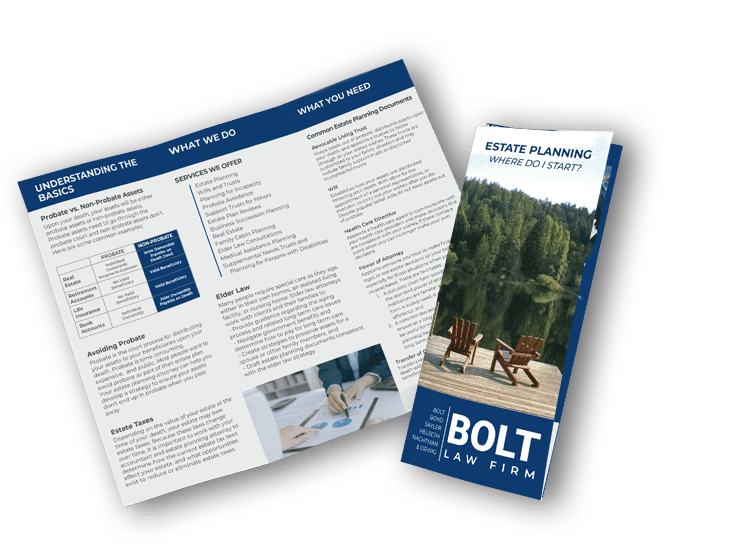
Anoka Estate Planning Attorney
Estate Planning Services in Minnesota
Estate planning lawyers address some of life’s most important issues, like how to protect your assets, plan for incapacity, and support children or other beneficiaries. As Minnesota’s population ages, these issues continue to become more important to more and more people. To protect your legacy, assets, and peace of mind, you should team up today with the trusted and friendly Anoka estate planning lawyers of Bolt Law Firm. We are committed to doing everything we can to make your plan for the future simple, effective, and affordable.
To get an initial consultation with our firm, dial (763) 292-2102 now.
What Is Estate Planning?
Estate planning is the legal process of preparing for the transfer of your wealth and assets in the manner you decide when you pass away, become incapacitated, or otherwise do not wish to manage them for yourself any longer. You can also create plans for how to care for your children if you cannot, as well as what to do about your medical and legal decisions when incapacitated.
Overall, your estate plan should contain your:
- Assets
- Life insurance
- Pensions
- Vehicles
- Real estate
- Personal belongings
- Debts
- Heirlooms
A well-structured estate plan ensures that you and your family are protected, there are no loose ends, and all your goals are met. An experienced estate planning attorney from our firm can structure your written, signed, and notarized estate plan precisely to your intentions. This is not just a tool of the wealthy, either. Regardless of the size of your estate, you and your family can be secure in the knowledge that you are preserving your property and possessions as well as your every desire for handling your affairs.
Key Components of a Successful Estate Plan
When creating an estate plan, we will want to consider the following and more:
- Business succession planning: Estate planning is a vital part of securing a business. Whether you want to keep a business in the family or sell it before or after you pass away, careful planning can ensure the business continues to operate in your absence and your family does not incur a large tax liability. There are ways to pass the business to a co-owner, too, such as a buy-sell agreement, that can be structured to accommodate your and your partners’ plans. You want to be certain that a business succession plan addresses the systematic transfer of ownership of the management of your business. In addition, a proper business succession plan will ensure that your business doesn’t end up in probate.
- Elder law: There are many legal nuances and concerns that apply mostly or only to senior citizens. Elder law is the broad legal category that covers these laws. Our attorneys can help you fully understand how elder law can affect your estate plan and what to do about it so that your estate plan continues to benefit you and your family, even after you are gone.
- Health care directives: A health care directive serves as a guideline on how you wish to be cared for if you become unable to communicate such desires. Typically, people choose a spouse or adult child to act as their agent should this need arise. It is their duty to fulfill your health care directive as best as possible while you are incapacitated. For the directive to be legally recognized, it must be in writing and signed by you or an authorized representative. Witnesses or a notary public are required to be present when this document is signed.
- Irrevocable trusts: A trust establishes a trustor, trustee, and beneficiary. It allows the easy transfer of property, finances, and other assets without the need for probate. An irrevocable trust cannot be changed or revoked once it has been created.
- Revocable living trusts: A revocable living trust can be revoked or amended once it has been created. People who use a revocable living trust usually do so to avoid probate. A revocable living trust also provides flexibility if relationships or assets change over time.
- Powers of attorney: A power of attorney (POA) is an essential part of an estate plan that has both benefits and limitations. The POA names one or more “agents” or “attorneys-in-fact” to act on your behalf, who will likely be your spouse or adult child. POAs can be general, allowing the agent to take any action on your behalf, or it can be limited to specific actions. The POA is necessary because you need someone to manage your assets, pay your bills, and make decisions for you if you become incapacitated.
- Transfer on death deeds: A transfer on death deed (TODD) is a beneficiary designation for real estate. It allows a piece of real estate to easily transfer ownership to the named beneficiary when you pass away.
- Wills: Also known as a “last will and testament,” a will is the basic building block of any estate plan. This document designates how one’s assets and properties will be divided upon their death. A will can also be used to name a guardian for minor children, as well as a personal representative who is responsible for carrying out the terms of the will.
Our attorneys can review the details of your current estate plan and prepare important documents to protect yourself, your legacy, and the future of your estate.
Ready to Plan Your Future? Contact Our Estate Planning Attorneys Now
Contact us today at (763) 292-2102 to schedule a free consultation with a member of our team.
Estate Planning FAQ
Have questions? We are here to help. Still have questions or can't find the answer you need? Give us a call at 763-292-2102 today!
-
Can a trust protect my assets from the nursing home?Sometimes, after a person passes away, nursing homes and other assisted living facilities can seek repayment by forcing the sale of assets in a trust. To protect assets from a nursing home, you must establish an irrevocable trust. With an irrevocable trust, the person who created the trust (known as the “grantor”) does not legally own the assets held within the trust. As such, the nursing home cannot access these assets or force their sale for repayment. With a revocable trust, however, the grantor does legally own the trust assets, meaning these assets could be used to repay a nursing home or Medicaid.
-
How do I protect my estate for my kids?The best way to protect your estate for your kids is to develop a comprehensive estate plan. Typically, this includes, at minimum, a last will and testament. It may also involve placing certain assets or properties into a trust, naming appointed guardians for minor children, and setting up healthcare directives/powers of attorney. Together, these elements can ensure that your children are cared for and provided for according to your wishes.
-
What happens if you die without a will?If you die without a will in Minnesota, your estate will be subject to the state’s inheritance laws, also known as “intestate succession.” These laws govern how estates are distributed, regardless of or in the absence of the noted wishes of the individual to whom the estate belongs. Generally speaking, intestate succession mandates that an individual’s assets, properties, money, and belongings be transferred to their closest living relatives, including the spouse, children, descendants, the spouse’s descendants, parents, and siblings.
-
Can I write my own will?In Minnesota, you are permitted to write your own will. To be considered valid and legally enforceable, a will must be completed in writing, must be signed by you (the “testator”), and signed by at least two witnesses. Additionally, the witnesses must be over the age of 18. In many cases, it is a good idea to have an attorney review or assist you in drafting your will. This is especially true for individuals with high net-worth or considerable assets or properties. Business owners and people who believe their will may be contested will also likely benefit from the assistance of an estate planning attorney.
-
Do I need a trust or will?You are not required by law to have a will or establish a trust. However, these are the basic building blocks of any solid estate plan. A last will and testament allows you to ensure that your assets, money, and properties are distributed according to your wishes after your death. Without this document, your estate will be divided according to Minnesota’s inheritance laws. Similarly, a trust can be used to distribute assets and properties after your death while allowing you to maintain control of those assets and properties while you are living. In some cases, trusts can be used to help your beneficiaries avoid certain taxes and, in some instances, probate.




.2210191544550.png)